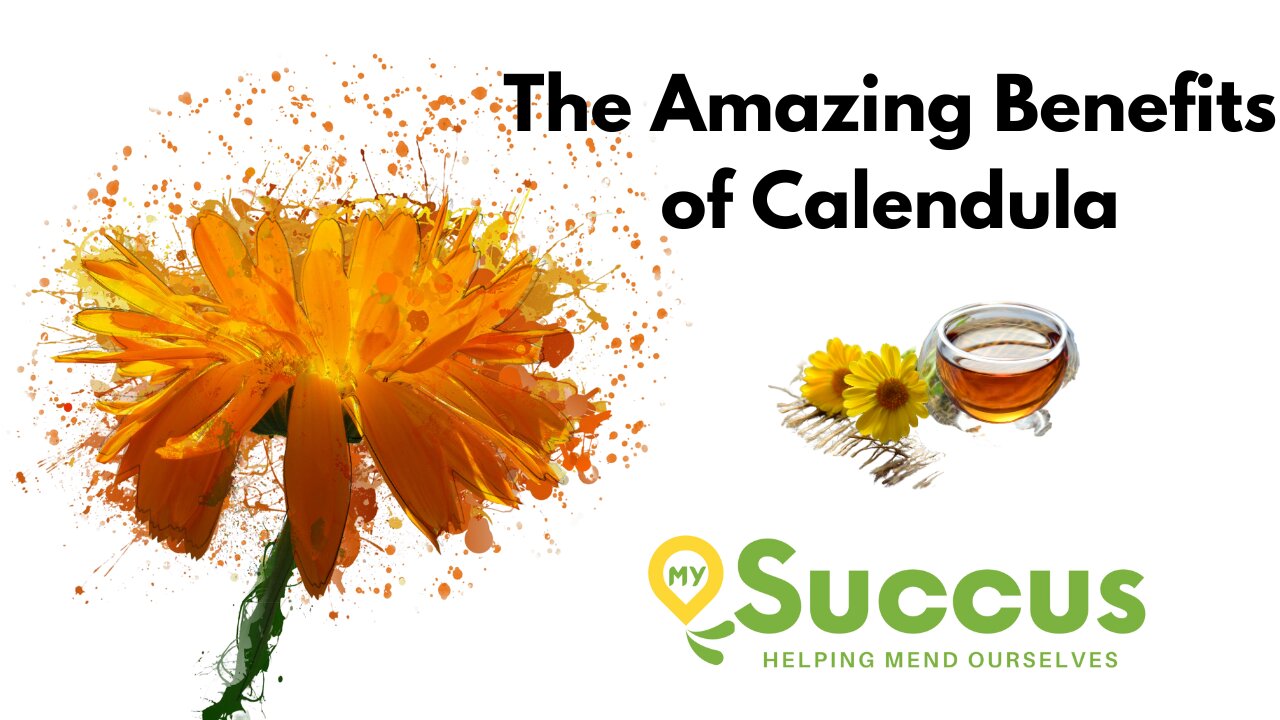Premium Only Content

The Amazing Benefits of Calendula
Calendula, a flowering plant also known as pot marigold, can be served as tea or used as an extract.
The tea is made by steeping the flowers in boiling water, the extract is derived from both the flowers and the leaves. Despite its slightly bitter taste, calendula tea is a traditional remedy used because of its therapeutic properties.
You can find the extract in oils, ointments, and tinctures.
1. Packed with antioxidants
Antioxidants are beneficial compounds that neutralize the harmful effects of oxidative stress in your body. Calendula extract contains several potent antioxidants.
Calendula has many anti-inflammatory compounds. Inflammation is a normal body response.
Chronic inflammation is linked to multiple conditions, which include obesity, metabolic syndrome, and type 2 diabetes.
In a research study, rats were fed monosodium glutamate also known as MSG. Calendula extract reduced oxidative stress and reversed the depletion of antioxidant levels by up to 122%.
MSG is a popular flavor enhancer that may cause headaches, dizziness, and numbness in sensitive individuals or when consumed in high doses.
2. May promote wound and skin ulcer healing
Calendula extract found in oils, ointments, and tinctures may be used topically to treat wounds and ulcers.
You can also apply the tea to your skin using either a cloth compress or spray bottle.
Studies indicate that calendula extract may regulate the expression of certain proteins that promote wound healing.
One test-tube study determined that calendula extract increased the amount of collagen in wounds as they healed. This protein is necessary to form new skin.
In a 12-week study involving 57 people, 72% of those treated with calendula extract experienced complete healing of venous leg ulcers.
In another 30-week study involving 41 adults with diabetes-related foot ulcers, 78% of participants achieved complete wound closure after daily treatment with calendula spray.
3. May combat certain cancer cells
Calendula’s antioxidant content may provide anti-tumor effects.
Test-tube studies suggest that antioxidants contained in calendula may fight leukemia, melanoma, colon, and pancreatic cancer cells.
Research indicates that the extract activates proteins that kill cancer cells while simultaneously blocking other proteins that would otherwise interfere with cell death.
4. May have antifungal and antimicrobial properties
Calendula extract is known for its antifungal and antimicrobial properties.
Research shows that oil from calendula flowers were shown to be effective against 23 strains of Candida yeast — a common fungus that can cause oral, vaginal, and skin infections.
Research has also indicated that calendula extract inhibits the growth of leishmania, the parasite responsible for leishmaniasis — a disease that may produce skin sores or affect internal organs, such as your spleen, liver, and bone marrow.
You can apply calendula oils, ointments, cloth compresses, or sprays directly to your skin.
5. May support oral health
Calendula may help treat oral conditions, such as gingivitis.
Gingivitis, which is chronic inflammation of the gums, is one of the most common oral diseases.
In a 6-month study involving 240 people with gingivitis, those given calendula mouthwash experienced a 46% reduction in inflammation.
Gargling calendula tea is said to relieve sore throats — although the evidence is anecdotal.
6. May improve skin health
Calendula extract is widely popular in expensive cosmetics, including creams and ointments.
Both test-tube and human studies show that calendula extract may enhance skin hydration and stimulate its firmness and elasticity, which could slow signs of aging. These effects are likely due to its antioxidant content.
Exposure to (UV) radiation is the leading cause of oxidative stress in the skin. One test-tube study determined that calendula oil has a sun protection factor (SPF) of 8.36. As such, sunscreens formulated with calendula oil may safeguard against sunburn.
A 10-day study involving 66 children with diaper rash determined that calendula ointment may work as a safe and effective treatment as well.
7. Other uses
May regulate the menstrual cycle. Calendula is said to induce menstruation and relieve menstrual cramps.
May relieves sore nipples during nursing. When applied topically, calendula products may treat cracked nipples during breastfeeding.
May work as a face toner. Calendula is believed to reduce acne and breakouts due to its antimicrobial properties.
May boost heart health. Calendula’s anti-inflammatory and antioxidant potential may help reduce the risk of heart attack.
May relieve muscle fatigue. Recent research indicates that calendula extract reduces exercise induced muscle soreness.
Side effects and precautions
The Food and Drug Administration (FDA) considers calendula safe for general use.
While it may improve skin health in some people, allergic reactions in the skin can occur in rare instances. You should test your skin’s reaction by applying a small amount of any calendula-based product prior to using it.
It's best to avoid calendula products while pregnant to reduce your risk of miscarriage because of the herb’s alleged menstruation effects.
In a review of 46 studies, it was determined that calendula may interfere with sedatives and blood pressure medications. If you’re taking either of these, it may be best to avoid calendula. Always consult with your doctor first.
-
 1:36:11
1:36:11
Tucker Carlson
1 day agoSean Davis: Trump Shooting Update, & the Real Reason Congress Refuses to Investigate
306K367 -
 5:13
5:13
Russell Brand
2 days agoHost GRILLS Pzizer CEO Over Vaccine Efficacy
88.2K215 -
 14:53
14:53
Stephen Gardner
4 hours ago🔥Alex Jones WARNS Trump not to DEFAULT on THIS!!
27.6K114 -
 31:54
31:54
The Why Files
5 days agoThe Quantum Apocalypse: All Your Secrets Revealed
70.2K59 -
 7:05:17
7:05:17
Sgt Wilky Plays
7 hours agoSaturday Hangout and Games
39K2 -
 8:23:23
8:23:23
DeadMan88
8 hours agoWGT Golf Road to Master
22.8K2 -
 1:35:04
1:35:04
Winston Marshall
2 days ago“This Wasn’t Accidental!” Maajid Nawaz SPEAKS OUT on R*PE Gangs and The REAL Cover-Up
102K61 -
 23:46
23:46
barstoolsports
9 hours agoSurviving Barstool Drama Spills Over Into The Office | Stool Scenes
70.8K3 -
 5:11:58
5:11:58
Shield_PR_Gaming
10 hours ago01/18/25. Let's chill with MMORPG and then some shooters!! Read Description! You know you want to!!
48.3K2 -
 1:09:39
1:09:39
Tactical Advisor
9 hours agoTrump Inauguration & New Gun Releases | Vault Room Live Stream 014
44.8K4